'Cab happy Cohn wil stay behinc the wheel
Page 33

If you've noticed an error in this article please click here to report it so we can fix it.
A profile of this year's
Champion driver
by John Darker
"On the day of the final I was in the right mental state to win, thanks to a couple of Anadin tablets to cure an early morning headache. I felt like a championship golfer who is sinking his putts. There must be an element of luck in winning the CM LDoY competition and any driver not on his very best form is unlikely to be successful."
That comment from this year's winner typifies the thoughtful nature of the 'Esso tanker driver who became the champion at the third attempt. In his first year's sally at Ruislap he was 14th in Class H. Last year, at Hayes, in Class F he won the class and was overall winner at Hayes, but only 9th in class F at the LDoY final.
This year he found the minor changes in the course lay-out to his liking: a shallower angle gave better mirror visibility in the reversing test.
'Gut-feeling'
I asked Colin how he decided when to brake in the difficult reversing tests. He said it was simply a matter of "gutfeeling" — "there comes a moment when your instinct says 'enough is enough.' If you try to go to the limit and stop short within an inch of the barrier you're pushing your luck too far."
Colin Burrows was an apprenticed motor vehicle engineer for some years after leaving school. He hankered for a driving job and from the age of 21 worked for a number of general haulage firms, an experience which made an indelible impression on him. The excessively long hours and the physical effort of loading and unloading vehicles depressed him. "It was a dog's life," he said.
In contrast, the regularised routine of an Esso tanker driver with its financial security and good pension arrangements, offers a worthwhile career.
I asked Colin if he had met with much opposition from his family or employer when deciding to abandon engineering maintenance for driving. His wife accepted the move if it would make him happier and his local management, aware of his state of mind, accepted the loss of trained skill reluctantly. Colin has never regretted the move for a moment and insists that he is "cab-happy," and likely to remain so for a long time.
As an LDoY winner working for a huge international company like Esso, it would be natural to consider an early transfer to supervision or management. Colin, a most resourceful man who had the initiative to visit America to observe their lorry driver contest, and to travel with truckers on the job, says he has no ambitions to get behind an office desk. "In my experience it's all too easy to get a responsible job and suffer ulcers quite soon as a result." I surmise that Colin's present attitude to management responsibility stems from his general haulage experience. He did once consider setting up as an owner-driver or small haulier, but when he tested the market on the crucial subject of haulage rates he found that traders offered about two-thirds of the rates indicated by CM's Cost Tables.
The experience has clearly shaped his attitudes to road haulage. He sees poor rates paid to small hauliers as an unmitigated evil, responsible for much of the environmental criticism faced by the industry.
As a TGWU member, and a one-time shop steward, Cohn is a severe critic of the public relations efforts of road hauage industry leaders to defend the interests of road haulage. "The press machines of the FTA and RHA spend too much time talking to their own members and not nearly enough time to defending the interests of road haulage in environmental societies and other public forums."
Colin was particularly incensed by a reported comment of Ray Buckton, the Locomen's leader, on the theme of lorries belching out diesel smoke. "He totally ignored the diesel smoke emitted by BR engines. I decided to have a go at Buckton through the TGWU and persuaded my branch to take it up to headquarters level." Initiative of this kind may have been responsible for Mr Ja Jones's effective retort to t railway lobby at the rece Trades Union Congress.
Thoughtful
Talking to a thoughtful m like Colin Burrows sugge5 that his powerful trade uni should make more use of 1. experience and attitudes. Iconstant theme that road hai age industry harms itself by failure to operate prof( sionally, at adequate haula rates, is reinforced by experience with Esso where driver can be pressured to ta an unroadworthy vehicle a and drivers suffer no financ: penalty if their vehicle und( goes necessary maintenance He fully endorses the unii attitude to tachographs. Wh conceding some merits tachos he would not like I day's routine to be dominat by the instrument. Drivers, argues, do not want their pe sonal freedom on the road be infringed.
"A small detour for person reasons — not the sort of pc cadillo that would merit mo than a mild telling off — wou be revealed on a tacho di We don't want that sort thing," he said.
He concluded our talk 1 returning again to the theme industry public relations : " like to put a fire under ro haulage industry spokesme They must talk to the indust critics and the general pub to explain that lorries provi a vital public service."
















































































































